As competition is fierce, consolidation became a key word in the Dutch horticultural industry. Last Friday, a major tomato merger was announced. They were precedented by four pepper cultivation companies, who merged under the name Rainbow Growers Group earlier this year, who are now a single company of nearly 100 hectares. In the case of the Rainbow Growers Group, though, this recent move has its foundations back in 1997.
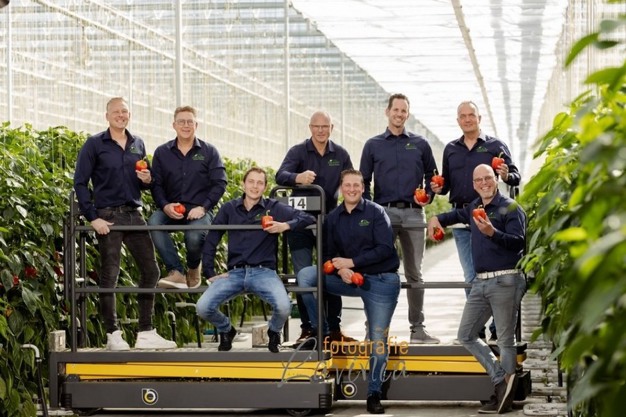
Management and team Young Rainbow
In the late 90s, Wim Grootscholten started his own growers' association — Rainbow Growers Group. That was progressive. He wanted to shorten the chain and give growers more direct lines of communication with customers. Several bell pepper growers joined and began centrally sorting and selling their products.
Twenty-seven years later, we sit in the room where those first sales were made. On the wall are aerial photographs of the nurseries that have grown considerably over the years. It is early April, and we sit here with Arco Vreugdenhil and Peter Steentjes, two of the newly formed company's five board members. The office is located at Growin Nursery, which was, strangely enough, not part of the merger. Somehow, that typifies Rainbow's remarkable growth story since 1997, in which a close-knit group of shareholders firmly established itself in the bell pepper market.
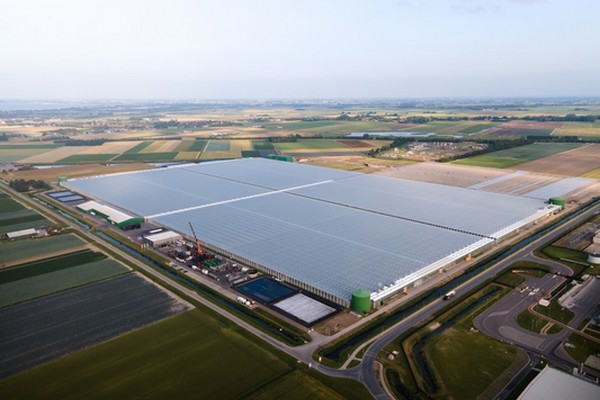 Kwekerij de Wieringermeer will expand with 5 hectare.
Kwekerij de Wieringermeer will expand with 5 hectare.
"Hurtling through the market"
By centrally sorting all colors of bell peppers and selling those itself, Rainbow could expand rapidly right from the start. Not long after it began, the group established Rainbow Kleinpak. The growers' association organizes cultivation, sorting, packing, and sales, and not only to Dutch customers. They manage the entire chain and can flexibly and quickly deliver Dutch bell peppers to supermarket chains. "We hurtled through the market," Arco begins.
When Anton Hiemstra asked the growers if they were interested in land in North Holland, Daaf Steentjes and Patrick Grootscholten took the bait. Daaf has the proverbial green fingers, and Patrick is organizationally and technically strong. They wanted to expand and soon asked John van Marrewijk to join them to oversee the commercial side of things. They bought 80 hectares of land, and in four phases, Kwekerij de Wieringermeer (40 hectares), and Rainbow Middenmeer (10 hectares) were created. That totaled 50 hectares.
At almost the same time, seven other growers were slowly expanding Powergrow to 12 hectares. That is also when Arco joined the Rainbow Growers Group. "I did an internship at Daaf and Patrick's nursery and gained useful financial knowledge," he says. That resulted in a four-member management team, with Arco joining the already active board comprising Daaf, Patrick, and John. Between 2006 and 2008, the Rainbow Growers Group grew fast, with plenty of new construction activity.
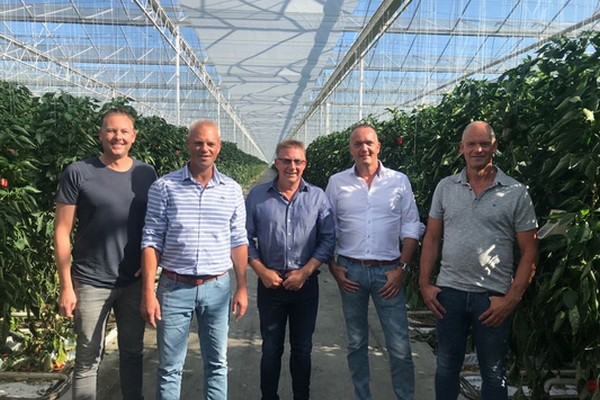
"Things moved fast after the crisis"
Not long after, the financial crisis hit. It is not a particular highlight in the company's timeline on the recently revamped website. Still, Arco refers to it as a period when the growers took a break from expanding for a while. Just before the crisis, in 2007, they'd celebrated the growers' association's 10th anniversary.
Several (bell pepper) farms had a tough time after the credit crunch, and the EHEC crisis added on to that. This eventually led to a large bell pepper growing company going under, and Rainbow groups were interested in that acreage. "We bought that nursery in 2013." And for the first time, they sought the help of an external financier, Arco recalls: "That was besides all the stakeholders putting in money."
These bell pepper growers are no strangers to jointly investing in horticultural projects. At the time, they were partnering with a British project, Thanet Earth. "We were also already all part of the cooperative. We like working together. You always need ideas, people, and money to implement those ideas. At Kwekerij Andijk, that all came together nicely." After buying Kwekerij Andijk 'at a low point', things progressed quickly. "We added another six and nine hectares," Arco remembers. By 2019, Andijk covered 25 hectares.
Pointed bell peppers added quickly and unexpectedly
For long, it was all about block peppers at Rainbow, but that changed in 2012 when Wim had an idea. "He, unexpectedly, offered a piece of land in the town of Wateringen. Wim gave us 45 minutes to decide, and we opted to do it to, for the first time, grow pointed peppers alongside block peppers." Kwekerij Het Westland was, thus, born. John, Arco, and Thimo van Marrewijk formed the management of this company, which at that time remained outside Rainbow, although they were all Rainbow growers. "We bought and rented greenhouses and traded older ones in." Kwekerij Het Westland grew, reaching 6.5 hectares.
Then, during the pandemic, Powergrow's stakeholders — seven people in their 50s and 60s — wanted to sell part of their company. That spurred Rainbow to take another step. "Buying 12 hectares is no small thing, so we opted for an acquisition and merge. Kwekerij Het Westland's shareholders joined, as did Powergrow's four remaining shareholders," Arco continues. It soon became evident that further growth in pointed peppers was possible. "The main question was where we wanted to achieve that." Powergrow's location proved well suited for that, and half of De Kwakel's block peppers also made way for pointed peppers. "The takeover went smoothly and turned out to be a successful formula. We hit the ground running."
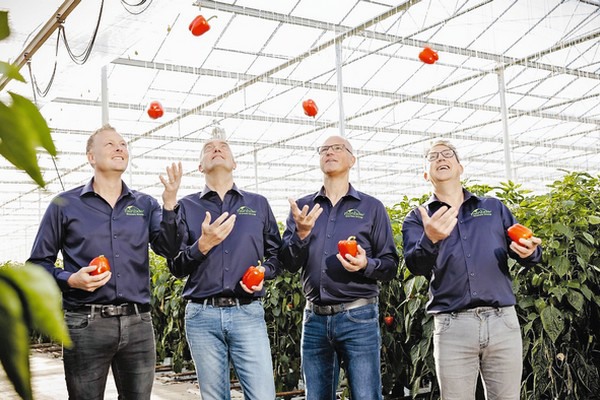
Board members Arco, Daaf, Peter, and Patrick. Absent: Thimo
Everyone in the 'family photo'
Peter, who became a board member in 2018, witnessed Rainbow's rapid growth since 1997. "Daaf asked me to join the board. It then became clear John was quitting as Kwekerij de Wieringermeer's commercial director and a Rainbow shareholder." The Rainbow name was still very well known in the market, but since its absorption into Harvest House, it was less active in day-to-day horticultural practice. Until now as the four nurseries mentioned earlier have merged. "As we grew, we kept making loose connections with the same people," Peter observes. He makes an apt comparison. "We were already siblings; now we're all in one family photo."
Thanks to the merger, Rainbow has made room for other farms to join in the future. "We've created a platform in which we went from our recent 80% cooperation to full cooperation, with a single HR department and, for instance, central energy purchasing," Arco says. Cultivation, technology, and labor remain independent per location, but there is a central personnel division with a single management team comprising Patrick, Thimo, Peter, Daaf, and Arco. Peter: "We bring together what we call 'upper' and 'lower Amsterdam.'"
Young Rainbow
Counting the acreage post-merger, you reach 90+ hectares. Rainbow Growers Group is growing slightly this year, too. Kwekerij de Wieringermeer is filling its last lot, adding five hectares to acreage in Agriport. Kwekerij Andijk has 25 hectares, Powergrow 12 and Kwekerij Het Westland 6.5. There are no concrete plans for further expansion. "We want to survive the bell pepper cultivation sector consolidation," Arco points out.
Looking to the future, the growers consider attracting young talent as vital. According to Peter, launching Young Rainbow ensures that. "With Marc Brekelmans, Bob Wever, and Youri Barendse, we've selected three young entrepreneurs in whom we're stimulating entrepreneurial qualities," he says. Thimo van Marrewijk is also still young, but is already a board member. "If everyone does well, we're well positioned for the future," he says. The idea is that after the development program, the younger generation can also be part of the Rainbow Growers Group.
Strategic considerations
Anyone talking to these greenhouse horticultural growers will not escape a look at the Netherlands' horticultural future. At Rainbow Growers Group, they are realistic and realize the acreage in the Netherlands is more likely to shrink than expand. "The Westland and Oostland are chock-full, complicating cultivation," Arco knows. Peter has another apt comparison. "You don't take an oil tanker into a ditch, do you?"
The bell pepper growers count themselves lucky to have a lot of acreage in 'two good horticultural areas'. "Steps are being taken at De Kwakel to develop alternative heat sources." The Rainbow Growers Group began moving away from gas in 2012. "Even then, we wanted to become less dependent on our CHPs and took an early step with geothermal energy in North Holland and Maasland," Arco adds.
These growers focus on local cultivation, and their slogan, "Feeding the world with healthy food," embodies their goal. Interestingly, while the Rainbow Growers Group is growing in the Netherlands, by the end of 2023, it had relinquished its shares in Thanet Earth, the British cultivation project. "After the Dutch shareholders pulled out of that project, we started thinking about our project in Tunisia, too."
"Those are strategic considerations. We don't grow tomatoes," Arco states. Growing bell peppers in Tunisia proved quite challenging, as did marketing the product year-round. The growers dismissed the idea of year-round cultivation with a lit crop in the Netherlands years ago. "Those numbers have never added up. We tried at two of our locations, but both production and quality weren't good enough." During the pandemic, they swapped out block pepper for snack tomatoes on their 10-hectare plot in Tunisia. "We intend to transfer that project to a tomato grower," Arco and Peter say.
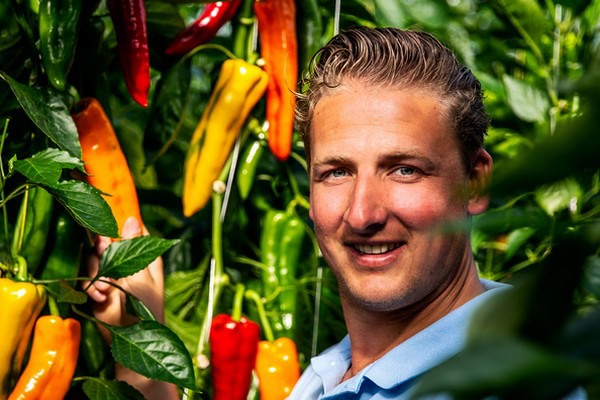
Thimo van Marrewijk, youngest member of the staff
"We've taken some big steps with this merger, but will definitely do more once we've gotten used to things." Any special areas of focus? "Growing with pointed peppers, organizational growth, and making our footprint more sustainable. Our carbon emissions have already dropped 70% in ten years," they say. A recent new step on that sustainability front is starting to use Source Irrigation Control. This smart AI-based software assists the growers in autonomously controlling irrigation.
"Kwekerij de Wieringermeer is the only bell pepper grower with 50 hectares already using this." Older Rainbow Growers Group shareholders are currently experiencing the merger and these developments. Arco: "One of them called me recently to say he was glad he had not stopped after all. He likes it all way too much not to live through this." The merger gives new impetus. It brings together a mix of young and old in one company that — with its nearly 100 hectares — has become one of the top three largest Dutch bell pepper growers. Further consolidation cannot be ruled out, either. Arco and Peter know their cooperative, Harvest House, welcomes that. "In both block and pointed bell peppers," the two men conclude.
For more information:
Rainbow Growers Group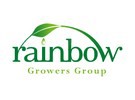
[email protected]
www.rainbowgrowers.nl
